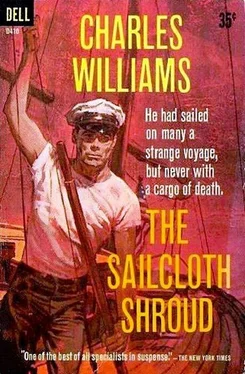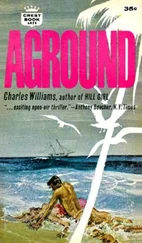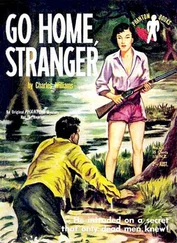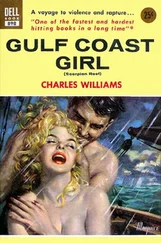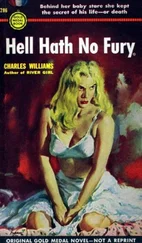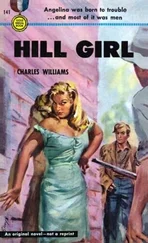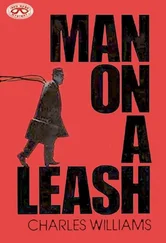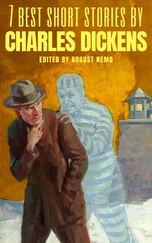Charles Williams - The Sailcloth Shroud
Здесь есть возможность читать онлайн «Charles Williams - The Sailcloth Shroud» весь текст электронной книги совершенно бесплатно (целиком полную версию без сокращений). В некоторых случаях можно слушать аудио, скачать через торрент в формате fb2 и присутствует краткое содержание. Год выпуска: 2010, Жанр: Старинная литература, на английском языке. Описание произведения, (предисловие) а так же отзывы посетителей доступны на портале библиотеки ЛибКат.
- Название:The Sailcloth Shroud
- Автор:
- Жанр:
- Год:2010
- ISBN:нет данных
- Рейтинг книги:3 / 5. Голосов: 1
-
Избранное:Добавить в избранное
- Отзывы:
-
Ваша оценка:
- 60
- 1
- 2
- 3
- 4
- 5
The Sailcloth Shroud: краткое содержание, описание и аннотация
Предлагаем к чтению аннотацию, описание, краткое содержание или предисловие (зависит от того, что написал сам автор книги «The Sailcloth Shroud»). Если вы не нашли необходимую информацию о книге — напишите в комментариях, мы постараемся отыскать её.
The Sailcloth Shroud — читать онлайн бесплатно полную книгу (весь текст) целиком
Ниже представлен текст книги, разбитый по страницам. Система сохранения места последней прочитанной страницы, позволяет с удобством читать онлайн бесплатно книгу «The Sailcloth Shroud», без необходимости каждый раз заново искать на чём Вы остановились. Поставьте закладку, и сможете в любой момент перейти на страницу, на которой закончили чтение.
Интервал:
Закладка:
6
The bunks had been torn apart. The bedding was piled on the settee and in the sink. My suitcase and duffel bag were emptied into the bunks, the drawers beneath them dumped upside down on the deck. Food lockers were emptied and ransacked. Charts, nautical almanacs, azimuth tables, magazines, and books were scattered everywhere. I stared at it in mounting rage. A hell of a security force they had here, one creaky old pensioner sitting up there calmly reading a magazine while thieves tore your boat apart. Then I realized it wasn’t his fault, nor Otto’s. Whoever had done this hadn’t come in the gate, and was no ordinary sneak thief. The watchmen made the round of the yard once every hour with a clock, but there was no station out here on the pier. I grabbed a flashlight and ran back on deck.
The Topaz lay near the outer end of the pier, bow in and starboard side to. There was a light at the shoreward end of the pier, but out here it was somewhat shadowy, especially aft. The marine railway and the shrimp boat that was on it blocked the view from the gate. There was a high wire fence, topped with barbed wire, on each side of the yard, so no one could go in or out afoot except through the gate, but the bayfront was wide open, of course, to anyone with a boat.
I threw the beam of the flashlight over the port side, and found it almost immediately. Freshly painted white topsides are both the joy and the curse of a yachtsman’s life; they’re beautiful and dazzling as a fresh snowfall, and just as easily marred. Right under the cockpit coaming was a slight dent, with green paint in it. Skiff, I thought, or a small outboard; it had bumped as it came alongside. If they had a motor, they had probably cut it some distance out and sculled in. Probably happened on Otto’s watch, right after I left. That meant, then, that there were at least four of them. But what were they looking for?
I was just straightening up when I saw something else. I stopped the light and looked again to make sure. There was another dent, about ten feet forward of this one. What the hell, had they come alongside at twenty knots and ricocheted? I stepped forward and knelt to have a closer look. There was a smear of yellow paint in this one. Two boats? That made no sense at all. One of the dents must have been made before, I thought. But it couldn’t have been very long ago, because it was only Thursday I’d painted the topsides.
Well, it didn’t make any difference. The point was that they’d been here, and they could come back. If I wanted to get any sleep I’d better move to a hotel; this place was too easy to get into. I went below and straightened up the mess. So far as I could tell, nothing was missing. I changed into a lightweight suit—the only one I had with me—put on some more shoes, and packed a bag with the rest of my gear. I gathered up the sextant and chronometer, the only valuable items aboard, and went up to the gate.
The old man was shocked and apologetic and a little frightened when I told him about it. “Why, I didn’t hear a thing, Mr. Rogers,” he said.
“It probably happened on Otto’s shift,” I said. “But it doesn’t matter; nobody would have heard them, anyway. Just keep this chronometer and sextant in your shack till Froelich gets here in the morning.” Froelich was the yard foreman. “Turn them over to him, and tell him to put a new hasp and padlock on that hatch. At yard expense, incidentally. And tell him not to let anybody down in the cabin until the police have a chance to check it for fingerprints. I’ll be back around nine o’clock.”
“Yes, sir,” he said. “I’ll sure do that. And I’m awful sorry about it, Mr. Rogers.”
“Forget it,” I told him. I called the police and reported it, with a request that they notify Willetts when he came on shift again. This had to be explained, because Willetts was in Homicide and had nothing to do with burglary. We got it straightened out at last, and I called a cab. The driver recommended the Bolton as a good commercial hotel.
I watched the empty streets as we drove through the warehouse and industrial district. No one followed us. Even the thought of violence seemed unreal. The Bolton was in the heart of the downtown business district, about three blocks from the Warwick. It was air-conditioned.
I registered, and followed the boy through the deserted corridors of two a.m., reminded of the description of a hotel in one of Faulkner’s novels. Tiered cubicles of sleep. The room was a cubicle, all right, but it had a night latch and a chain on the door. When the boy had gone I slipped the chain in place, took a shower, and lay down on the bed with a cigarette.
Who was Baxter?
He’s a legacy, I thought. An incubus I inherited, with an assist from Keefer. Baxter to Keefer to Rogers—it sounded like the infield of a sandlot baseball team. Why had he come aboard the Topaz? He’d obviously lied about the job and about wanting to save plane fare home. He hadn’t struck me as a liar, either; aloof, maybe, and close-mouthed, but not a liar. And certainly not a criminal. I’d liked him.
Who were the men after him? And why wouldn’t they believe he had died of a heart attack? And just what did I do now? Spend the rest of my life looking under the bed, sleeping behind locked doors on the upper floors of hotels? It was chilling when you thought of it, how little the police could actually do about a thing like this, unless I wanted to go down there and live in the squad room and never go out at all. And trying to convince myself that I was any match for professional hoodlums was farcical. Violence was their business. It wasn’t a sport, like football, with rules, and time out when you got hurt. Even if I had a gun and a permit to carry it, it would be useless; I was no gunman, and didn’t want to be one.
I lighted another cigarette, and looked at my watch. It was almost three a.m.
The only way to get a line on them, Willetts had said, was to find out who Baxter was. And since the physical remains of Baxter were buried beyond the reach of the human race for eternity, the only thing left was trailing him backward in search of some clue. That, obviously, was a job for the FBI. But so far the FBI didn’t even have a place to start. I had four days.
Take it from where you left off, I thought: the morning we sailed. After breakfast the three of us had turned to, replacing the stainless-steel lower shroud on the port side of the mainmast. Baxter was a willing worker and he was good with wire, but his hands were soft and he apparently had no gloves. I noted also that he was working in the pair of gray flannel slacks. While we were still at it, the stores came down. We carried them aboard and stowed them. There was a discrepancy in the bill that I wanted to take up with the ship chandler, so I asked the driver for a ride back to town in the truck. Just as I was going ashore, Baxter came up from below and called to me.
He handed me twenty dollars. “I wonder if you’d mind getting me two pairs of dungarees while you’re uptown? The stores were closed last night.”
“Sure,” I said. “What size?”
“Thirty-two waist, and the longest they have.”
“Right. But why not come along yourself? We’re in no bind.”
He declined apologetically. “Thanks, but I’d just as soon stay and finish that wire. That is, if you don’t mind getting the dungarees.”
I told him I didn’t. He took an airmail letter from his pocket and asked if I’d drop it in the box for him—
Paula Stafford!
I sat up in bed so suddenly I dropped my cigarette and had to retrieve it from the floor. That’s where I’d heard the name. Or had seen it, rather. When I was mailing the letter I’d noticed idly that it was addressed to somebody at a hotel in New York. I wasn’t prying; it was merely that the New York address had struck me, since he was from San Francisco, and I’d glanced at the name. Stanford? Sanford? Stafford? That was it; I was positive of it.
Читать дальшеИнтервал:
Закладка:
Похожие книги на «The Sailcloth Shroud»
Представляем Вашему вниманию похожие книги на «The Sailcloth Shroud» списком для выбора. Мы отобрали схожую по названию и смыслу литературу в надежде предоставить читателям больше вариантов отыскать новые, интересные, ещё непрочитанные произведения.
Обсуждение, отзывы о книге «The Sailcloth Shroud» и просто собственные мнения читателей. Оставьте ваши комментарии, напишите, что Вы думаете о произведении, его смысле или главных героях. Укажите что конкретно понравилось, а что нет, и почему Вы так считаете.
